#35: What is happening in the DRC? 🇨🇩
More information about the silent genocide that has already claimed the lives of nearly six million people in The Democratic Republic of the Congo.
Hello, my friends,
This month, I’ve been thinking extensively about Hawaii, Puerto Rico, Palestine, Sudan, and the Congo, and how we can take direct action to help the innocent civilians impacted by these conflicts.
First, before I begin, I want to extend a warm thank you to any and all activists and everyday people who have the bravery to stand up against senseless violence and who have the courage to call for a ceasefire, demand accountability from our lawmakers, and to all who are actively organizing and mobilizing to create a more loving and liberated world.
Today, I will be specifically talking about the DRC, but I would like to emphasize that I stand in solidarity with any oppressed group of people, no matter where they might be in the world, and please, do not stop talking about or posting about the groups and people that you are advocating for. Every post matters and your collective voice has the power to change the world. Please never forget this.
I will be writing more extensively about Hawaii, Puerto Rico, Sudan, Congo, Palestine, and many others going forward, but today we will be focusing specifically on what is happening in Congo.
Let’s dive in:
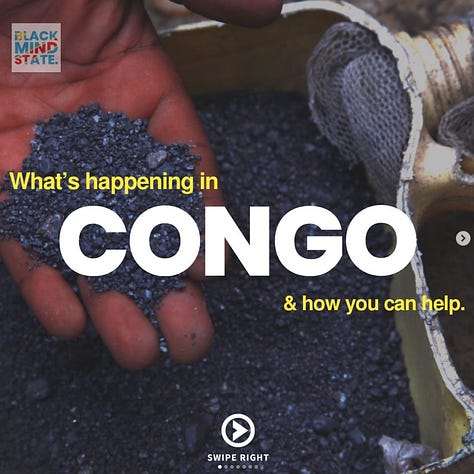
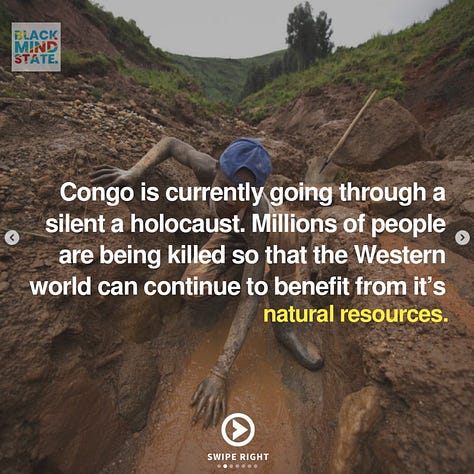
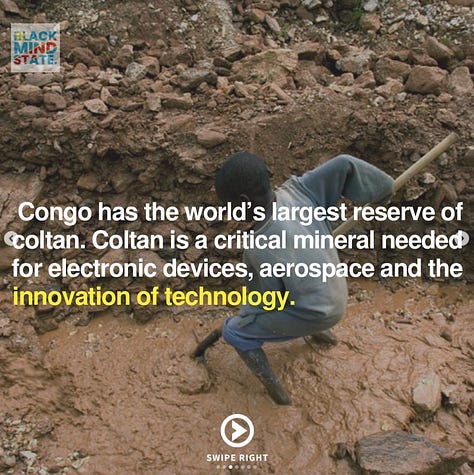
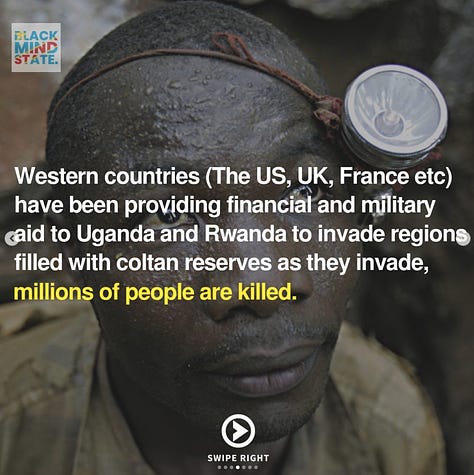
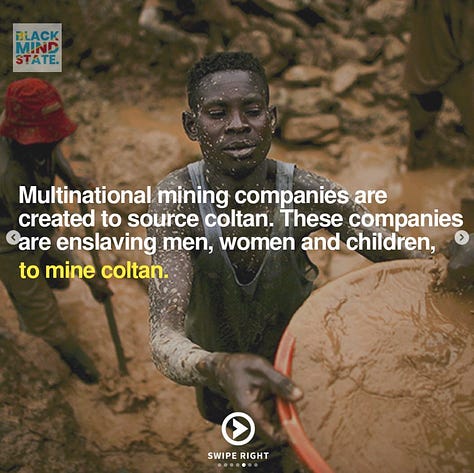
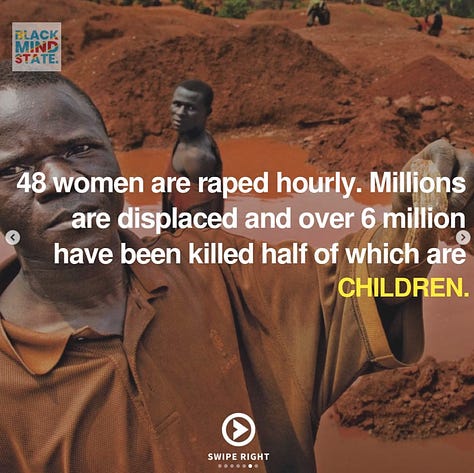
TLDR:
There is a silent genocide going on in the Congo (DRC). Global tech giants and Western countries are actively turning a blind eye towards and in some instances (Rwanda) directly propping up and funding violent militant groups that are killing, raping, and inflicting enforced labor (i.e. slavery) onto the men, women, and children of the Congo. Those who speak out are killed and tortured. All of this is to extract coltan, cobalt, and other conflict minerals that are dense in the Congo.
Instead of the Congolese people profiting off of the riches found underneath their own lands, this wealth is being stolen, so that you and I and persons around the world can buy iPhones, electric cars, MacBooks, and any tech products that use these minerals. The conditions in the mines are so dire, and collapses are so frequent, that tens of thousands die each month. It is estimated that nearly six million people have already been murdered during this genocide. The key players here (i.e. the most complicit) are Apple, Google, Dell, Microsoft, Telsa, global tech consumers, the M23 militia, and Paul Kagame (President of Rwanda).
Current lawsuits have been brought against some of the most powerful tech companies, but their behavior remains largely unchanged, and in fact, as demand increases, is only getting worse. The most effective things we can do is learn about this issue, educate as many people as possible, and demand action from these tech giants. The most effective way we can get them to listen is a consumer boycott of any new tech products from the key players.
Read the full article here. Dell, Microsoft, and Tesla are also among tech firms named in cases brought by families of children killed or injured while mining in DRC.
Before we talk more about boycotts and donations, let’s talk about how we got to where we are today:
The history of the Democratic Republic of the Congo leading up to 1996
If you are like me, your knowledge of the Congo, until now, was largely limited to Joseph Conrad’s Heart of Darkness, Barbara Kingsolver’s Poisonwood Bible, and Adam Hochschild’s King Leopold’s Ghost.
These books were assigned to me in school and I wrote reports on them, noting how horribly unfair and grotesque the degree of colonialism and violence inflicted was. And then, like many, I moved on, and for much of my life, as I imagine many of you can relate, I haven’t actively thought about the history of the Congo, and how its exploitation dramatically shapes the world we know today.
To learn more, read King Leopold's Ghost: A Story of Greed, Terror, and Heroism in Colonial Africa by Adam Hochschild. You can purchase that book here.
The history of the Congo is as rich and varied as any country, with powerful kingdoms like Kongo, Lunda, Luba, and Kuba from the 14th century onwards. The Kingdom of Kongo, in particular, became a significant state in western and central Africa. Contact with Portuguese traders in the late 15th century led to a period of wealth, but also to involvement in the Atlantic slave trade, which intensely destabilized the region in the most horrific way possible.
Belgian colonization began in 1885 when King Leopold II established the Congo Free State, notorious for its exploitation and atrocities. Words can’t even do justice to how horrific this period was for the DRC.
Following WAY TOO LATE international condemnation, control was transferred to the Belgian government in 1908, creating the Belgian Congo.
Independence from Belgium was achieved in 1960, but the young nation quickly plunged into the Congo Crisis, with secessionist movements in Katanga and South Kasai, and the assassination of Prime Minister Patrice Lumumba.
To learn more about this brief glimmer of hope at self-determination and democracy that was squashed by the CIA, check out this amazing book published only last month, from fellow Dartmouth grad, Stuart A. Reid, called The Lumumba Plot: The Secret History of the CIA and a Cold War Assassination. You can purchase the book here.
Following the assassination, chaos ensued.
Colonel Joseph Mobutu, later known as Mobutu Sese Seko, took power in a coup in 1965, renaming the country Zaire. He ruled for decades with an authoritarian grip, suppressing opposition and promoting Africanization. By the 1990s, his weakened regime conceded to share power but promised elections never materialized, setting the stage for further violence and chaos.
The history of the Democratic Republic of the Congo, 1996 to present
Since 1996, the Democratic Republic of Congo (DRC) has been a focal point of one of the world's worst humanitarian crises, characterized by widespread conflict, political instability, and endless human rights violations (murders, tortures, forced labor, modern-day slavery, and modern-day child slavery).
Following the end of Mobutu Sese Seko’s long authoritarian rule in 1997, the country, then known as Zaire, was plunged into the First Congo War which led to the rise of Laurent-Désiré Kabila as the head of state.
However, the conflict persisted, morphing into the Second Congo War from 1998 to 2003, involving multiple African nations and resulting in millions of deaths from violence, famine, and disease. Despite the formal end of this war, fighting continued, particularly in the eastern provinces. The region of Kivu became a flashpoint due to the presence of various armed groups vying for control over the mineral-rich land.
The M23 movement, composed mainly of Tutsi rebels, emerged in 2012, named after the March 23, 2009, peace agreement which they accused the government of violating.
The group quickly seized territory, including the major city of Goma, prompting concerns about regional stability. Although a peace deal was signed in 2013 and the M23 officially disbanded, sporadic fighting has persisted, with the group resurfacing and becoming active again in 2021.
Throughout these years, the UN and various NGOs have been deeply involved in humanitarian efforts within the DRC, though the challenges are immense due to ongoing war and genocide, endless displacement, and rampant government instability.
The DRC's vast element and mineral wealth (coltan, cobalt, gold, etc.) continues to be a double-edged sword, providing potential for economic development but also fueling conflict.
The Rise of Mining for Conflict Minerals as a new form of Forced Slavery in the Congo
A great place to start to further understand what is happening NOW, as in, TO THIS VERY DAY, is Siddharth Kara’s book on the subject, Cobalt Red.
Cobalt Red delves into the grim reality of cobalt mining in the Democratic Republic of the Congo (DRC), highlighting the exploitation of its people, including children, in the quest for the valuable metal. The DRC is responsible for producing approximately 75 percent of the world’s cobalt, a component in the rechargeable batteries used in a wide array of consumer electronics and electric vehicles.
Kara's investigation into this issue reveals that many of the workers, including men, women, and children, face "sub-human conditions" in the mines. These individuals endure immense suffering, with many losing their lives, all to extract a mineral that is a linchpin in the workings of modern technology.
The cobalt boom fueled by the demand for high-tech metals has led to a significant human cost, with thousands of workers, including children, put at risk in horrific mining conditions. Reports indicate that over 40,000 children work as laborers in the cobalt mines of the DRC, enduring long hours—averaging 12 hours a day—for meager pay, sometimes as little as two dollars a day, and many more, especially those mining coltan with their bare hands, are not paid at all.
You can read more about this in Siddharth Kara’s stellar book: Cobalt Red: How the Blood of the Congo Powers Our Lives.
Organizations you can support who are making a direct impact on the ground in DRC:
While the situation might seem hopeless, there are SO many things that we can be doing every single day to help. One of the best things is to actively support the efforts of existing organizations on the ground. One of my favorites is called Friends of the Congo.
Friends of the Congo (FOTC) is a non-profit advocacy organization based in Washington, D.C., established in 2004 with the mission to work alongside Congolese institutions to foster peaceful and lasting change in the Democratic Republic of Congo (DRC). The organization seeks to raise global consciousness about the challenges facing the Congo and supports the nation's drive towards a peaceful and prosperous future where Congolese can realize their considerable human and natural potential.
The organization's focus is broad yet impactful, addressing global issues that have a direct effect on the Congo and its people. FOTC emphasizes the importance of the Congo in the fight against climate change, noting the country's role in housing part of the world's second-largest rainforest. Advocacy extends to vulnerable populations affected by the region's conflicts, particularly children and women, and ties the use of everyday products like automobiles, airplanes, and cell phones to the resources extracted from the Congo, highlighting the global interconnectivity and responsibility towards the country.
Maurice Carney, a representative of FOTC, articulates the organization's stance on the interconnectedness of global issues, such as climate justice and the advocacy for vulnerable groups within the Congo, tying the well-being of the Congolese people to broader human concerns. This approach reflects a comprehensive view of the Congo's significance on the world stage, not just as an African issue, but as a worldwide concern.
Friends of the Congo is so fantastic, they’ve been actively working and organizing for DECADES. I have been consulting with them directly and I am so inspired by their work.
They have so many local community partners on the ground working to rescue children from mines, as well as incredible work to uplift and support women, men, and children impacted by the ongoing war. They directly fund youth and artists, women-led businesses, mental health counseling, medical supplies, food, water, shelter, education, and more!! You can read more about their stellar work HERE.
You can watch their stunning film Crisis In The Congo: Uncovering The Truth, available for free on YouTube:
Also be sure to follow their channel, Friends of the Congo:
Content creators to support those who are actively raising awareness about this topic:
First and foremost, I would recommend the stellar
, who has an incredible podcast episode that gives an overview of what is happening in Congo, and overview of the book Cobalt Red, and what you can do to help RIGHT NOW.Episode synopsis: “Congo is currently undergoing a silent genocide. We are lifting our voices for the people of DRC. This episode is my imperfect attempt to amplify the ongoing situation in Congo, and share the 5 greatest lessons I learned from a book I read in light of the moment we are in called Cobalt Red: How the Blood of the Congo Powers Our Lives by Siddharth Kara.
In this episode, I also read an overview of what’s happening in the Northern Kivu regions where militia groups are massacring, exploiting, and sexually assaulting Congolese people. Free Congo, Free Sudan, Free Palestine, Free Haiti, and free all nations and peoples suffering under colonial, capitalist, supremacist, and military violence.”
Alright, that’s it for me today folx, more is coming very soon. Stay tuned! I’m also thinking of changing the name of this publication to Love & Liberation Daily, what do you think?
PS: If you’re interested in learning more about and staying up-to-date with what’s happening in Palestine, a great place to start is the phenomenal work of
Josh is a Jewish labor activist and prolific writer who has written thoughtfully and extensively about the gravity of our current moment. Make sure you complete each step on Josh’s action list below and please share the list far and wide!!!
SIX ACTIONS TO TAKE RIGHT NOW FOR PALESTINE:
1. Apply pressure for a ceasefire now: ceasefiretoday.com
2. Take action with Jewish Voice for Peace: jewishvoiceforpeace.org
3. Take action with the Palestinian Youth Movement: palestinianyouthmovement.com
4. Take action with IfNotNow: ifnotnowmovement.org
5. Support Boycots, Divestmest, and Sanctions: bdsmovement.net
6. Find a protest to attend: gazaispalestine.com/protest
Thank you
for this incredible action list! 📝Y’all, please read and amplify Josh’s work! 📚




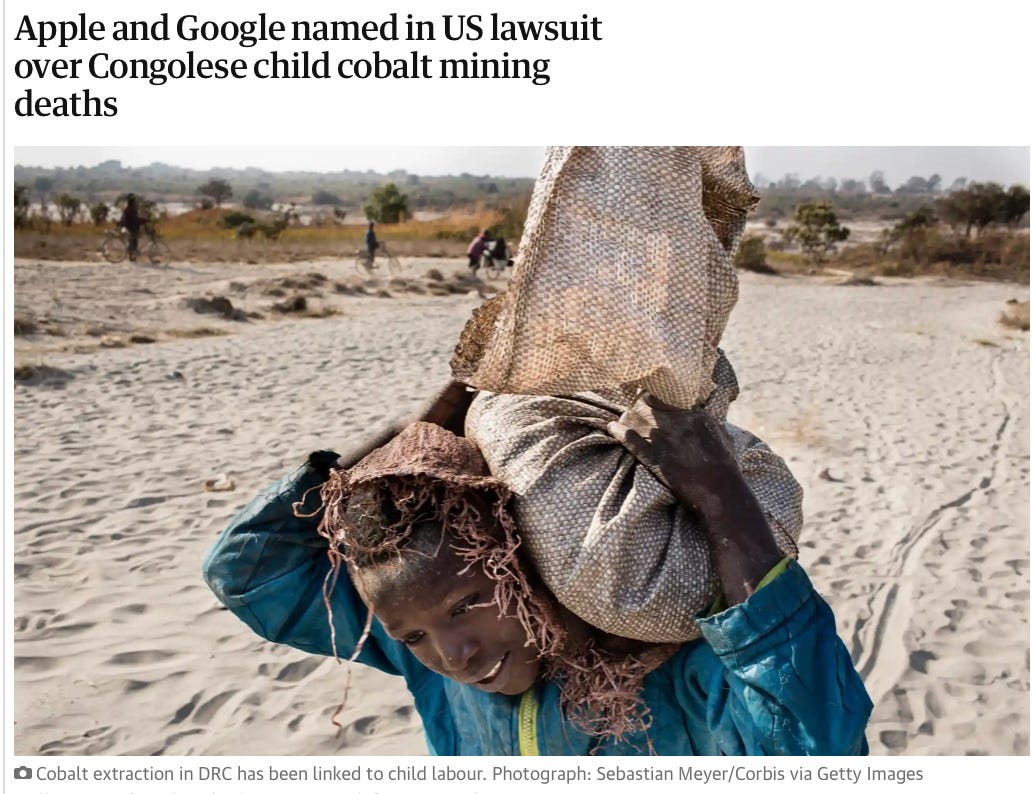
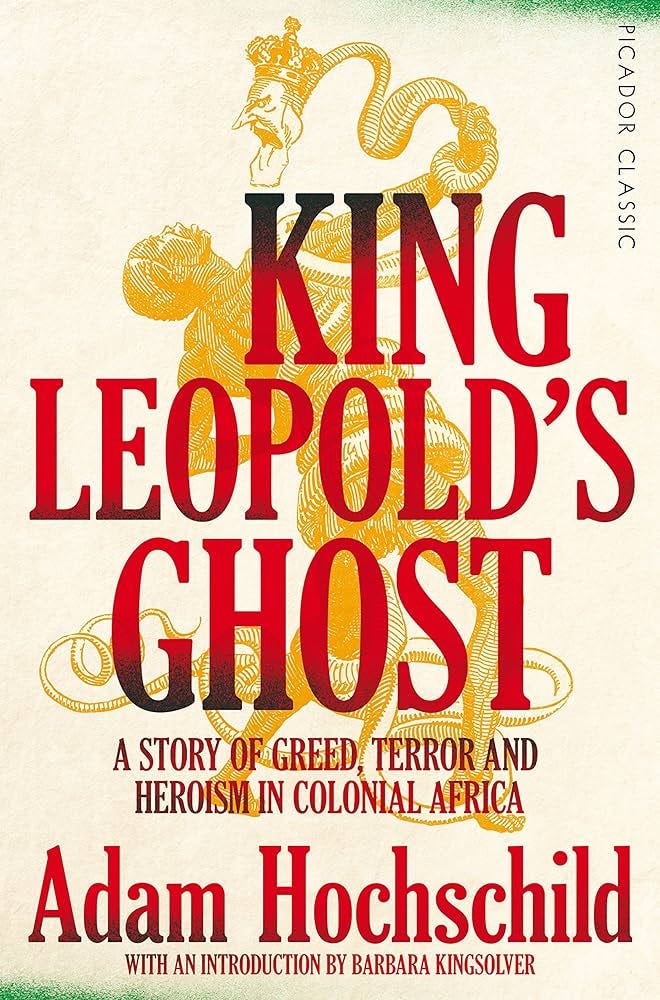
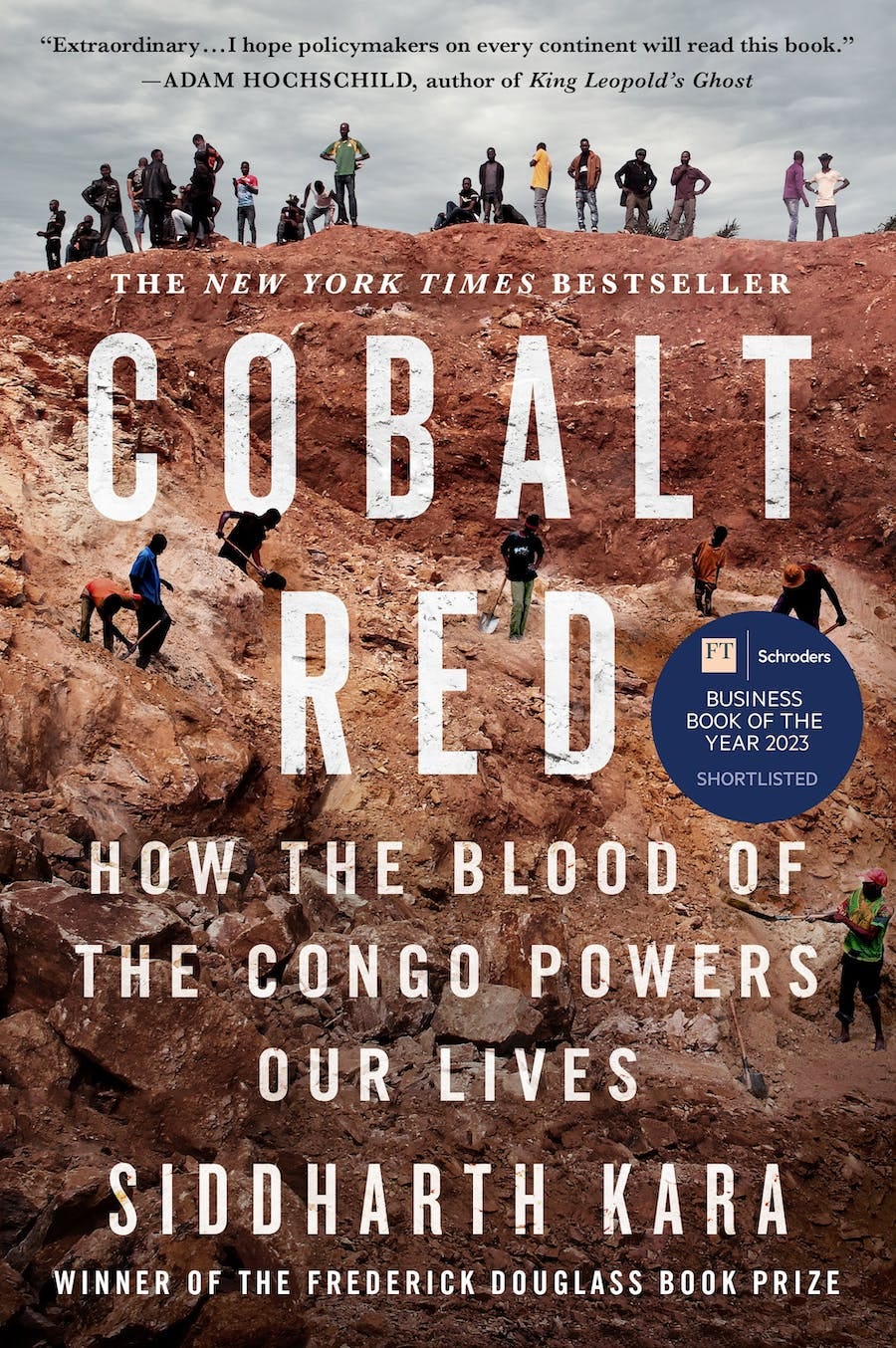
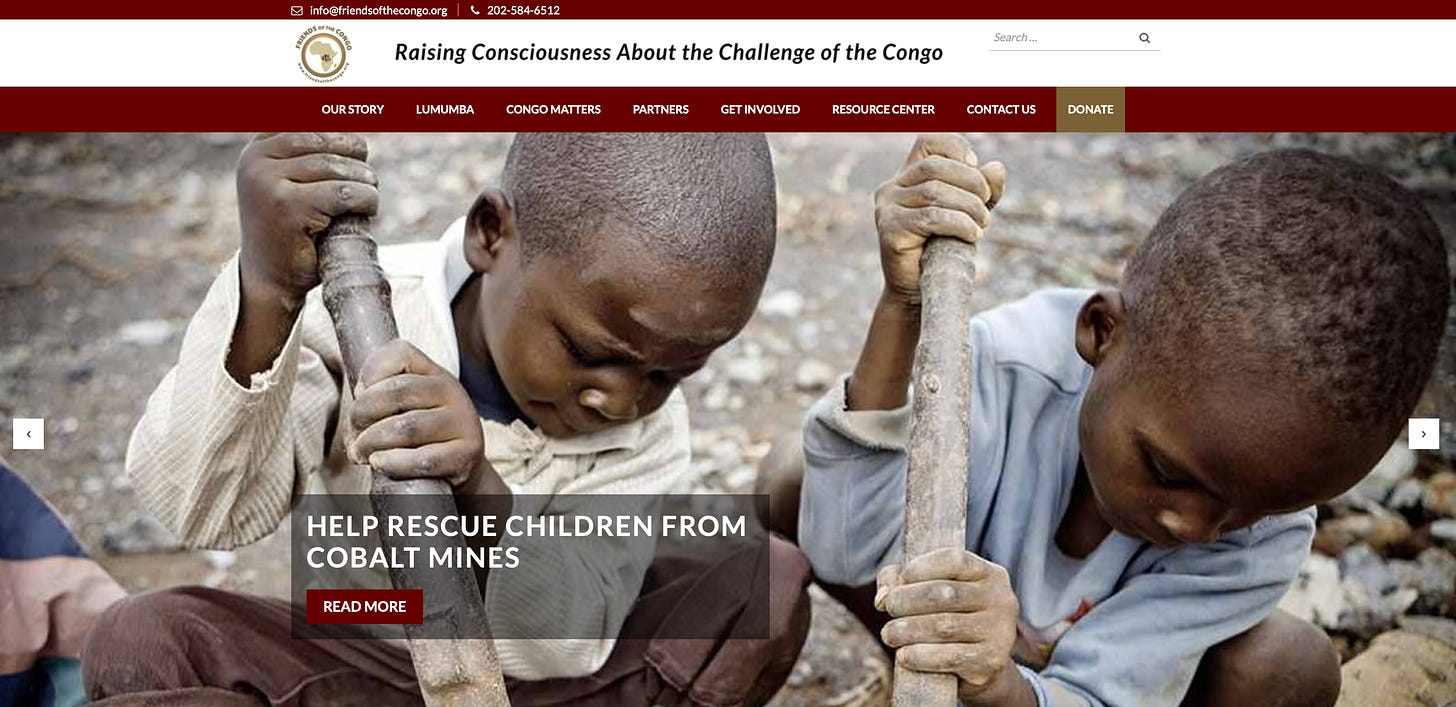


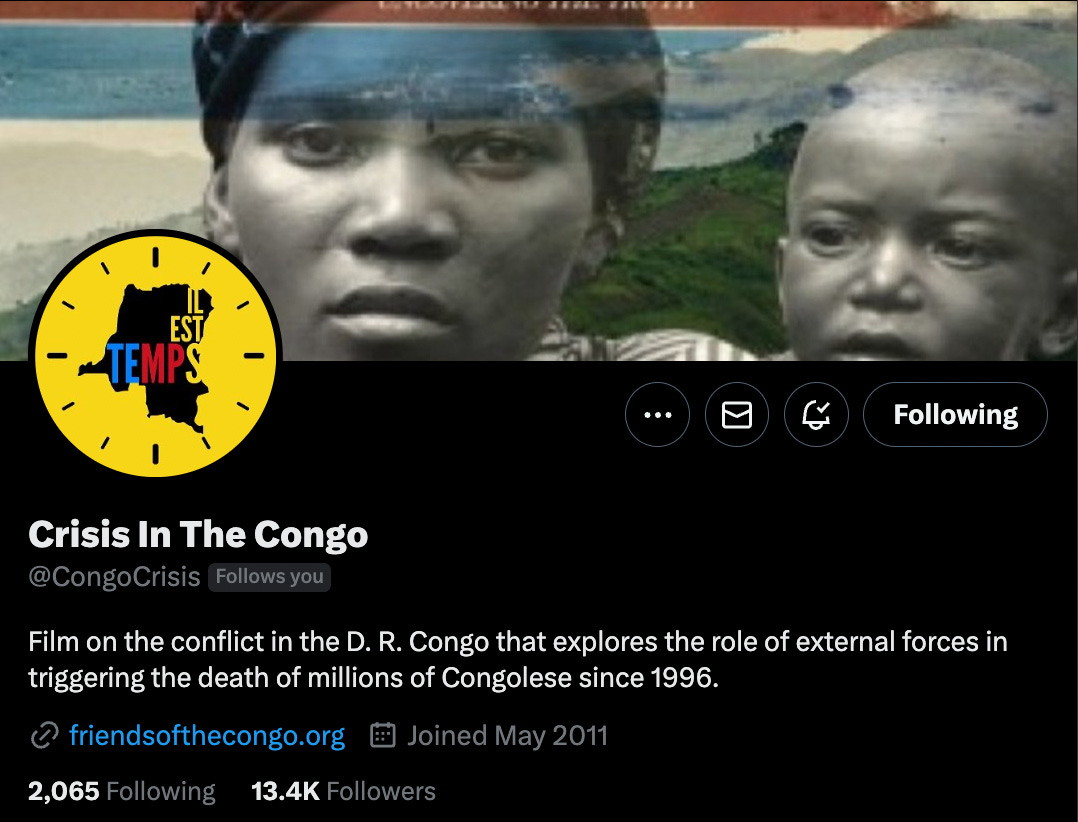
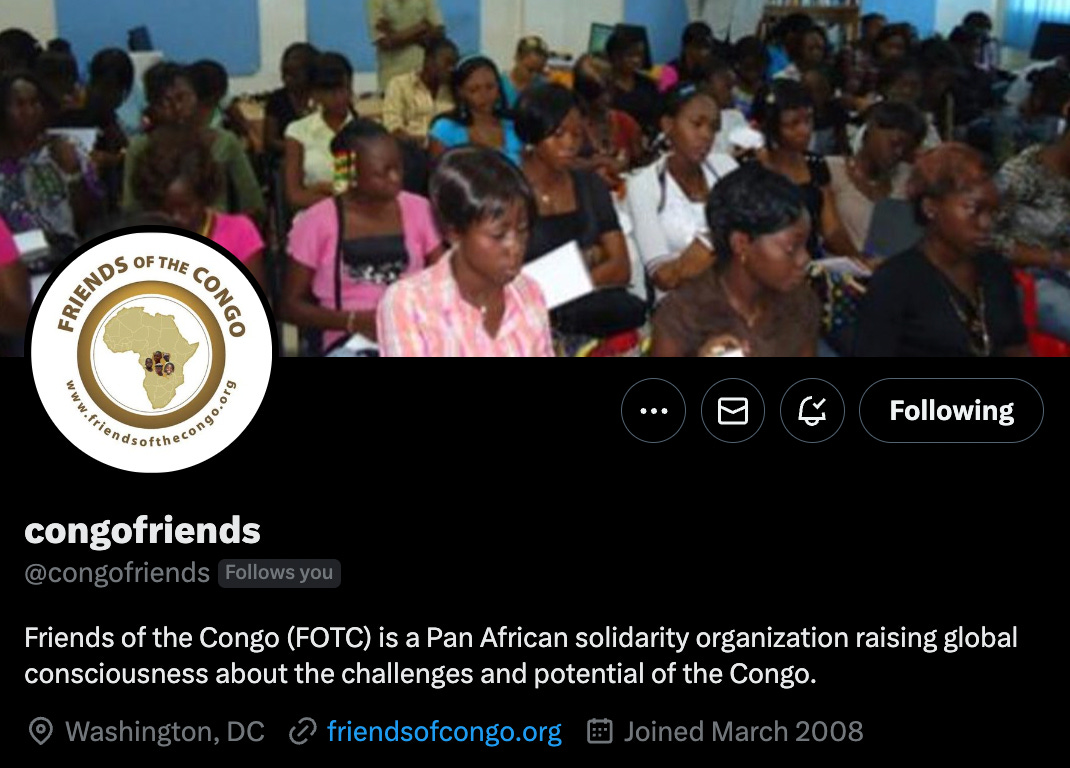

hi, i want to amplify a comment someone left at @ayandastood's substack regarding the genocide in congo, it drew attention to the issue that many books etc. written about the DRC don't provide an accurate description and recommends reading books by congolese folks. this is the comment
"I appreciate you sharing these resources -- as a Congolese person, I am critical of what is considered to be a resource on DRC -- people online are largely sharing books & documentaries by non Congolese people & not taking into account that such sources are colonial & do not help in building solidarity with Congolese people.
I wouldn’t recommend Cobalt Red or other history books on Congo written by non Congolese people & encourage people to read this review of Cobalt Red & to read books on Congo by Congolese authors.
https://www.opendemocracy.net/en/beyond-trafficking-and-slavery/cobalt-red-siddharth-kara-democratic-republic-congo-book-review/
Books:
The Congo from Leopold to Kabila: A People's History by Georges Nzongola-Ntalaja
The History of Congo by Ch. Didier Gondola"